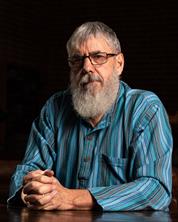Author and social entrepreneur Robert Ashton, FRSA, writes about how businesses can create better futures for themselves and society. But looking around the Suffolk community where he has spent his whole life, he believes there is much to be re-learned from the generations who went before.
For more than 50 years I have been fascinated by the stories George Ewart Evans (1909-1988) collected in the 1950s from his neighbours in and around the Suffolk village of Blaxhall. He was a Welshman, who moved to the village when his wife Florence became headmistress at the village school in 1948. As an outsider, he recognised that the dialect he was hearing and the ways he was witnessing dated back to the time of Chaucer.
A keen listener, despite (or perhaps because of) being rather deaf, Evans encouraged those with time to talk, to tell him how life used to be when they were young. Living next door to the school house was Robert Savage (1879-1956) who had retired after being a shepherd for most of his life, as had his father and grandfather. Not surprisingly, Robert and his wife Priscilla would feature prominently in Ask The Fellows Who Cut The Hay, Evans’s first book about Suffolk’s oral history, published by Faber in 1956.
In the early 1970s I worked on farms a few miles from Blaxhall, and found much of what he wrote familiar. I worked alongside men related to those Evans had known, I married into a local farming family and for a time, became part of the rural landscape Evans had so vividly documented. Other connections emerged, as I realised that I had known Florence Evans when she was headmistress at Needham Market primary school and I was a rather shy six year old. She was also a Quaker, as am I, and so the Evans household will have been influenced by that tradition, just as mine is today.
Evans wrote about a time when people lived in harmony with the land. The milk that Blaxhall’s milkman placed on his doorstep had come from cows grazing a mile from his house. His neighbours talked of how they used to go gleaning after the harvest was done, picking up the ears of wheat left behind by the horse-drawn reaper binder. The church bells would toll to mark when gleaning could begin and when it was time to go home. The wheat collected was kept, ground by the village miller (who retained some as payment for his service), then baked in the bread oven that every cottage had beside the hearth.
Priscilla Savage told Evans how her life revolved around bread, beer and bacon. She brewed the ‘small’ beer that was drunk to quench thirst and looked after the pig they kept at the bottom of their garden. Water was drawn from a well and so it was often contaminated. Electricity did not arrive in the village until after the Second World War. Life was tough and money was scarce but the village was largely self-sufficient – people looked after each other as they always had done. It helped that of the 150 or so households, there were, as the postman wryly commented, 40 Lings and 20 Smiths.
In 2019 I stopped work and joined the creative writing MA at the University of East Anglia. Already a published author, I wanted to write books that would help people see their world a little differently. In particular I wanted to write a book that built on the work of George Ewart Evans, perhaps interviewing grandchildren of those he had interviewed and explaining how life in rural England continued to change. I have spent the last two years working on that book and have been surprised and encouraged by what I have discovered.
The greater social and geographical mobility that has allowed successive generations to travel more widely and follow careers that would have been unthinkable in the 1950s came as no surprise. Ivan Savage, a grandson of Robert Savage, had for a few years become the fifth generation shepherd in his family. But he left the land and built a successful business installing grain-handling equipment. As a shepherd, Ivan had only travelled when showing his employer’s sheep at an agricultural show. As an entrepreneur he had travelled widely, and marked his retirement by taking his wife on a world cruise aboard the QE2.
But while that social mobility has created opportunity, it has largely broken our link with the land and the natural cycle of the farming year. Most of us no longer live near our parents, and bacon now comes from Tesco not the pig that lived at the bottom of the garden. The bread we eat is baked in a distant factory from wheat that may have been grown in North America. This has taken us away from the way people had always lived and not necessarily made us any happier. Arguably this disconnect is why so many of us now rely on antidepressants to face each day.
A phrase that emerged from my research gave me hope. The RSA has rightly chosen to focus on encouraging a ‘regenerative future’. The very real threat posed by climate change, the rocketing price of fossil fuels, and the logistical problems caused by labour shortages have highlighted the folly of our reliance on global supply chains. I met people who have chosen to farm in a regenerative way. They are profitable because they add value to what they grow, not because they chase high yields by throwing fertiliser and chemicals on their fields. I met a 25-year-old village blacksmith, successful because he uses the internet to attract business, and a woman who takes wool and wild plants from a local farm, spins, dyes, and then knits garments that will last a lifetime.
None of those I interviewed for my book consciously set out to create a regenerative future, they simply followed their instinct and heart and did what felt right. I think we all need to rediscover ways our grandparents took for granted and that our parents dismissed as old fashioned. Only then can we create a better world for future generations.
Robert Ashton is an author, social entrepreneur, charity trustee and Quaker. He is currently writing a book that explores how rural life has changed over the past 150 years. For more information contact Robert@robertashton.co.uk

Become an RSA Fellow
The RSA Fellowship is a unique global network of changemakers enabling people, places and the planet to flourish. We invite you to be part of this change.
Related articles
-
Introducing the Fellowship Promotion Guide
Fellowship news
Fionna Monk
Our brand-new Fellowship Promotion Guide is a powerful new resource designed to make it easier than ever for current Fellows and staff to share the value of the RSA Fellowship with others.
-
Why 2025 is an exciting year to be an RSA Fellow
Fellowship news
Fionna Monk
Happy New Year! 2025 is shaping up to be a landmark year for the RSA Fellowship, brimming with new opportunities, initiatives, and global collaborations. There’s never been a more exciting time to be part of this dynamic and engaging community. Here’s more on why this year promises to be an inspiring and impactful year for RSA Fellows worldwide.
-
Counting the cost of bowling alone
Blog
Andy Haldane
In his 2025 CEO Lecture, Andy Haldane addresses how the ever-increasing cross-border flows of goods, people and information affect widening divisions and accelerate the depletion of social capital.




Be the first to write a comment
Comments
Please login to post a comment or reply
Don't have an account? Click here to register.